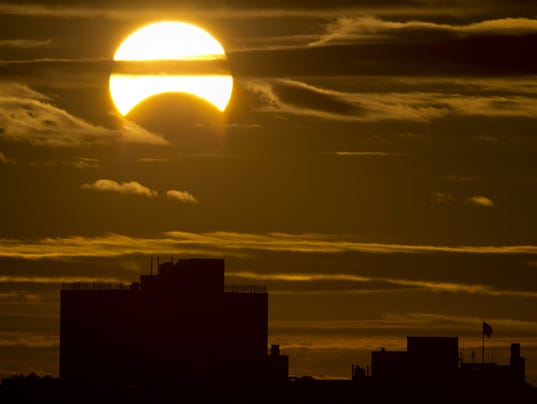
Don't forget to look up Thursday.
In the afternoon, a partial solar eclipse — where the moon covers a part of the sun — will be visible across much of the USA, barring any pesky clouds that could block the show.
The eclipse will occur over most of North America — except for a small slice of eastern Canada and eastern New England, said meteorologist Joe Rao of Space.com.
In most areas, about half the sun will be covered, with the northern USA seeing about 65% of the sun covered and the Southern states closer to 40%, reports Universe Today, an online astronomy site.
Overall, the farther west and north you are the better, Sky and Telescope magazine reports. In the West, the entire eclipse will happen while the sun is still fairly high in the afternoon sky: In Los Angeles, for example, NASA says the eclipse will start at 2:08 p.m. PT and will end at 4:40 p.m. PT.
In most of the eastern half of the USA and Canada, the eclipse will still be in progress at sunset — offering dramatic views if you can find a low western horizon, according toSky and Telescope. In New York City, the eclipse starts at 5:49 p.m. ET and will last until the sun sets at 6:03 p.m. ET.
YOUR TAKE: Share your photos of the solar eclipse
However, "people who live east of a line running from roughly Quebec City to Montauk Point, N.Y., will miss out on the solar show, since the sun will set before the dark disc of the moon begins to encroach upon it," Rao said.
This is the third eclipse that's been visible in the USA this year; the first two were lunar eclipses, one of which occurred in April and the other earlier this month.
During a solar eclipse, the sun, moon and Earth form a nearly straight line, with the moon in the middle. The moon temporarily blocks the sun in select areas on Earth.
Unless you use a special filter, such as welder's glasses, never look directly at the sun during the eclipse, or at any time for that matter. Universe Today warns that dangerous ultraviolet and infrared light focused on your retinas will damage your vision for the rest of your life.
Your camera also needs a special filter in order to photograph the eclipse.
The USA's next solar eclipse — which will be a total eclipse — won't occur until August 2017.


No comments:
Post a Comment